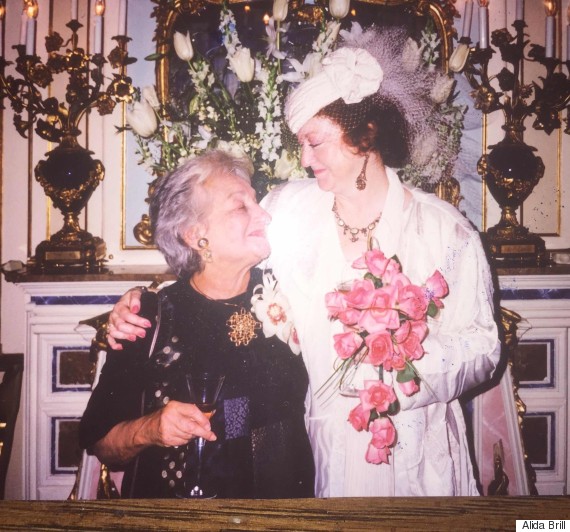On February 4, 2006, Betty Friedan died, on her 85th birthday.
In 1963 she wrote the book that served as a road map for millions of women -- primarily white suburban housewives -- to new areas of fulfillment, especially to paid employment. The Feminine Mystique changed my mother's life, as it did the lives of many women. It wasn't my book then; I was still a girl. But its residence in our household could not be overlooked. My father took to calling it "The BOOK."
What few remember, or perhaps some never knew, is her dedication in The Feminine Mystique: "For all the new women, and the new men."
From the very beginning of Friedan's thinking about a brave new world for women, she wanted men to be included, to be part of the conversation of women's liberation. In The Feminine Mystique, she wrote how unfair the suburban life was for men, who worked too hard, drank too much, and suffered heart attacks. She had an almost utopian vision of what domestic life could and should be for husbands and wives.
But not many men saw her as a champion of their rights, or viewed her brand of equality for women as good for husbands. She was thought naïve not to understand that what seemed so right, so natural and so fair to her, was revolutionary to many. Her work tried to upend a stratified and entrenched social system of gender. Some women didn't want to go to work, or give up the guise of femininity in order to be equal to men. Men didn't want to share power at work, or their status as head-of-household. But she never gave up on that ideal, and she never gave up on men.
Much of what she wrote that should happen, did happen. But much still needs to be done. Ask any young woman with a husband and kids trying to make her way in a career or on the job, and you'll hear Friedan's messages still ringing clear. But they need revision and expansion. She knew that women's employment without adequate infrastructure for childcare was a task only half completed.
We're still far from the goal of men becoming a true part of the dialogue, of men understanding that they need to learn they are a part of it all. They are not the enemy; we want them on our team. In one of the early presidential debates, Senator Bernie Sanders, clearly a friend of women's rights, talked about the need for a mother to have time with a newborn child, when he should have spoken about family leave, so that a father also could have time to bond with his infant.
Betty would have hissed at him. Bernie: It's about the men too!
Betty became a part of my life almost as soon as I moved to New York. For three decades she was a girlfriend, a pal, a confidante, a guide -- and another mother. Betty held one of the chuppah poles at my wedding, and wagged her finger at the groom in an attempt to smooth my way in what she suspected would be a challenging marriage.

Betty was impatient, short-tempered, needy. Just as often she was generous, loyal, inspiring, loving. Her flaws were legendary and well-reported. To those who couldn't understand how I could remain close to her I said, and I say: I knew a different Betty. I loved her. It was my privilege to know an intimate side of a woman visited by many of the same insecurities and emotional challenges that confront us all. We also shared the particular bond of chronic illness. Betty had asthma attacks and I have an incurable autoimmune disease. In addition to the vocabulary of the women's movement, we spoke the coded language of women and chronic illness long before it became a media topic.
Betty had another incurable disease. She was a romantic. I plead guilty to that too. She once called me a romantic feminist, and when I bristled, she lectured me that there was no contradiction between the words "feminist" and "romantic." But Betty Friedan was never completely at ease with the word "feminist." In that discomfort, she shares something with young women today who believe in the rights of women but shy away from the label. Betty was known for telling others she had come too late for the feminist movement, even while insisting she was its founding mother.
Friedan loved men, and hoped always to achieve a lasting relationship after her marriage broke up. She wanted to love and she wanted to be loved. Though there were any number of suitors and companions, she never found what she had envisioned. But she never gave up on the ability, and possibility, for men and women to love one another wholly and equally (and even now, it still feels revolutionary to be writing these words). That, I think, is the most romantic part of her.
Sitting on my bookshelf is a tattered copy of The Feminine Mystique, inscribed to my mother: For Ida, my dear friend Alida's mother, who has evolved beyond this herself, a new woman in her own right, as a token of my delight in her daughter's being. L'Chaim. Betty Friedan.
Ten years after her death, and 53 years after the publication of the book that changed lives, I say: Here's to the new women who continue to be born and to evolve. But we need to see more of the new men joining our forces for change. We're not there yet.
Alida Brill is the author of DEAR PRINCESS GRACE, DEAR BETTY: The Memoir of a Romantic Feminist, to be published next month.